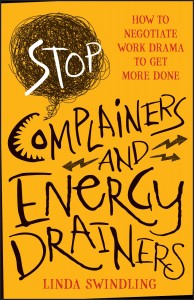By Jill Scott, Manager of Member Services, The Academy for Private Duty Home Care
You may not realize it, but there’s a good chance that you have some less than positive employees – let’s call them “Complainers” – that are invisibly draining the energy of their fellow co-workers and also affecting your bottom line.
 The good news is that there are tactics you can use to change that situation and even convert them to contributors within your company. Our good friend and colleague, Linda Swindling, JD, CSP, has studied this element in business and has come up with tried and true methods for working with complainers to change their effect on the company from negative to positive. She’s written a book all about it, “Stop Complainers and Energy Drainers”, and will be our guest on our next live web conference, “Top 5 Ways to Stop Complainers and Turn Them Into Contributors”, on August 14th, 2014 at 4:00 pm eastern, sponsored by Caregiver Quality Assurance.
The good news is that there are tactics you can use to change that situation and even convert them to contributors within your company. Our good friend and colleague, Linda Swindling, JD, CSP, has studied this element in business and has come up with tried and true methods for working with complainers to change their effect on the company from negative to positive. She’s written a book all about it, “Stop Complainers and Energy Drainers”, and will be our guest on our next live web conference, “Top 5 Ways to Stop Complainers and Turn Them Into Contributors”, on August 14th, 2014 at 4:00 pm eastern, sponsored by Caregiver Quality Assurance.
Linda describes Complainers as energy drainers who create messy, inconvenient work drama and the disruptions they cause involve negative emotions, illogical behavior, irritants and interruptions to getting your job done. Complainers can be found in all industries and in offices of all sizes.
 In the book Linda discusses the Ten Business Reasons to Stop Complainers:
In the book Linda discusses the Ten Business Reasons to Stop Complainers:
1. The cost
2. Negative effect and loss of good employees
3. Legal ramifications
4. Environmental infection
5. Signal of problem or mental illness
6. Your sanity
7. Business reputation
8. Complainers’ potential
9. Counterproductive strategy
10. The right thing to do
You’ll notice that the reasons identified are not necessarily tangible, but mostly intangible reasons that they are negatively affecting your company’s bottom line without you even knowing it. Managers and those further up the line may not know that an employee falls in the “Complainer” category, but there’s a good chance that numerous fellow employees of the Complainer know it and have been affected by it. When a Complainer shares their negative thoughts or comments with another employee, the non-complainer can not only be put in a negative mindset, but possibly turned into a Complainer. And that’s not good for the overall morale of your employees.
Not only does the book describe the 5 different types of Complainers – whiners, complicators, prima donnas, controllers, and toxics – but it also gives you a road map to help you navigate negotiations with Complainers, with the goal of turning them into productive, contributing employees. There are lots of ways to deal with Complainers in an effort to get them to either stop complaining or turn their attitude around, but how you approach them depends on their personality and what type of Complainer they are.
I worked in 2 different law firms over the span of 10 years, and the Complainers that I encountered could turn my day upside down in an instant, which unfortunately, changed the outcome of my entire day and even my mindset about my job as a whole…even though I really liked my “job” and the people that I directly worked for. Sadly, this also happened in the first law firm I worked at where there were only 3 staff members and 3 attorneys…so don’t think to yourself that your office is too small to have a Complainer (or two)! In a small office, the Complainer may just be more covert about it, but cause just as much damage. And if a Complainer confides in the same handful of co-workers day in and day out, the co-workers can be more affected by the Complainer than anyone else.
If you’d like to learn how to stop Complainers in your office, or even in your personal life, you’ll want to join us on Thursday, August 14th for the live web conference “Top 5 Ways to Stop Complainers and Turn Them Into Contributors”. Everyone who registers for the web conference will receive a free copy of “Stop Complainers and Energy Drainers”!
If you are a member of Caregiver Quality Assurance, registration for the web conference is FREE. Look for an email from Diane with your registration link.
Also, if you are a Premium Member of The Academy for Private Duty Home Care, registration is FREE. Look for an email from Jill with your registration link, or you can log-in and go to the Online Learning page for your registration link.




